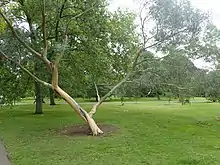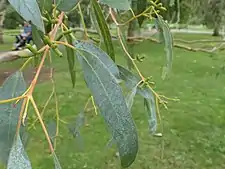Eucalyptus glaucescens
Eucalyptus glaucescens, commonly known as the Tingiringi gum[2] or Tingaringy gum,[3] is a plant in the myrtle family Myrtaceae and is endemic to south-eastern Australia. It is a tree or mallee with smooth bark and dull greyish foliage growing in the higher parts of southern New South Wales and Victoria.
| Tingiringi gum | |
|---|---|
 | |
| E. glaucescens in Kew Gardens | |
| Scientific classification | |
| Kingdom: | Plantae |
| Clade: | Tracheophytes |
| Clade: | Angiosperms |
| Clade: | Eudicots |
| Clade: | Rosids |
| Order: | Myrtales |
| Family: | Myrtaceae |
| Genus: | Eucalyptus |
| Species: | E. glaucescens |
| Binomial name | |
| Eucalyptus glaucescens | |
| Synonyms[1] | |
Description
Eucalyptus glaucescens is a tree which sometimes grows to a height of 40–50 m (100–200 ft), or a mallee. The bark is smooth, grey, green or yellow and is shed is short ribbons. (Sometimes the bark on the lower part of the trunk of the tree form is rough or fibrous.) Its adult leaves are lance-shaped, dull greyish-green, 60–120 mm (2–5 in) long and 12–20 mm (0.5–0.8 in) wide. The juvenile leaves are arranged in opposite pairs, heart-shaped to more or less round and lack a peduncle. The flowers are arranged in groups of three and the flower buds are 5–8 mm (0.2–0.3 in) long and 3–4 mm (0.1–0.2 in) in diameter. The flower caps are cone-shaped or hemispherical and much shorter than the rest of the bud. The fruit is cup-shaped to cylindrical, 6–12 mm (0.2–0.5 in) long and 6–10 mm (0.2–0.4 in) in diameter.[2][3][4]

Taxonomy and naming
Eucalyptus glaucescens was first formally described in 1929 by Joseph Maiden and William Blakely from a specimen collected on Tingiringi Mountain. The description was published in Volume 8 of A Critical Revision of the Genus Eucalyptus, edited by Maiden.[5][6] The specific epithet (glaucescens) is the incipient form of the Latin word glaucus meaning “blue-grey” or "blue-green",[7]:369 hence "becoming blue-grey or blue green".[7]:44
Distribution and habitat
Tingiringi gum grows in shrubland on granite slopes on the southern tablelands of New South Wales south from the Australian Capital Territory to high mountain areas in Victoria.[2][3]
References
- "Eucalyptus glaucescens". World Checklist of Selected Plant Families (WCSP). Royal Botanic Gardens, Kew.
- Hill, Kenneth. "Eucalyptus glaucescens". Royal Botanic Garden Sydney: plantnet. Retrieved 27 August 2017.
- "Eucalyptus glaucescens". Royal Botanic Gardens Melbourne. Retrieved 27 August 2017.
- "Eucalyptus glaucescens". Centre for Australian National Biodiversity Research. Retrieved 2 June 2020.
- "Eucalyptus glaucescens". APNI. Retrieved 27 August 2017.
- Maiden, Joseph (ed.) (1929). A Critical Revision of the Genus Eucalyptus (Volume 8). Sydney: Alfred James Kent, Government Printer. p. 56. Retrieved 27 August 2017.CS1 maint: extra text: authors list (link)
- Brown, Roland Wilbur (1956). The Composition of Scientific Words. Washington, D.C.: Smithsonian Institution Press.
External links
 Media related to Eucalyptus glaucescens at Wikimedia Commons
Media related to Eucalyptus glaucescens at Wikimedia Commons